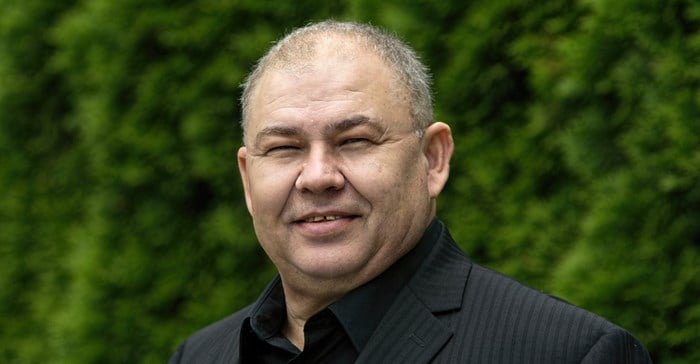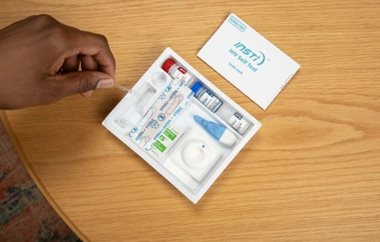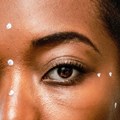South Africa has the largest number of people living with HIV worldwide. Early diagnosis and initiation of appropriate treatment can greatly improve their health outcomes and life expectancy. It stands to reason that self-testing for the virus puts their health in their own hands, and is set to be the way of the future.

Source: Supplied. Hans Croukamp, bioLytical Laboratories' chief operating officer.
South African born Hans Croukamp, bioLytical Laboratories' chief operating officer, explains how his company has implemented a dedicated local team in South Africa to provide rapid, reliable home testing for HIV particularly among the youth.
"We have a crucial need to safeguard the health and well-being of our youth by addressing the rising prevalence of HIV and sexually transmitted infections (STIs) among this demographic," he says."
According to the Centre for Disease Control and Prevention, testing rates among high school students are extremely low. The youth face various challenges when it comes to HIV testing. Fear, stigma, lack of access and concerns about confidentiality are common barriers.
"In addition, the social and emotional pressures that accompany this period of self-discovery can make traditional testing methods seem daunting or intimidating. Recognising these challenges, self-testing offers a solution, aligning with the mindset of the youth and addressing their unique needs."
Here Croukamp unpacks the impact his company's HIV-1/2 antibody self test is having on the most vulnerable in our communities.
Since when have people been able to self-test to ascertain their HIV status in South Africa? The Insti®
HIV-1/2 antibody self test (ST) received its World Health Organization prequalification (WHO PQ) in 2018, allowing bioLytical to sell the test across the African continent (we received our CE mark in 2016 and Health Canada authorisation in 2020).
Where do people get hold of these test kits?
Currently kits are primarily available through government hospitals and clinics, as well as outreach programmes. There is also limited access to the kits in private pharmacy chains. These test kits form part of the SA government’s strategic plan to reduce the burden of HIV/Aids in South Africa and we are in discussions to make these kits more easily accessible for the general public.
How do they work?
Insti is a single-use rapid test that uses proprietary flow-through technology to detect HIV-1 and HIV-2 antibodies using a drop of human fingerstick blood. The test is intended for untrained lay-users. The test has three simple steps. First, use the lancet to collect a drop of blood and add to bottle 1 and shake. From there, you pour the bottle onto a membrane. Once bottle 1 has been absorbed, pour in bottle 2, and once bottle 2 is absorbed, pour in bottle 3. Once bottle 3 has absorbed, you can read your results.
How much do they cost?
Approximately R90.
 How reliable are they?
How reliable are they?Insti is incredibly accurate with 100% positive percent agreement (PPA; sensitivity) and 99.5% negative percent agreement (NPA; specificity).
Do the test results get fed back into a central government database?
Yes. As the government is the custodian of HIV data, there is a mandatory requirement to report to them the number of test kits dispatched as well as the details of any patients who test positive.
How has the South African market responded? From your data, who is buying the kits, and what has the demand been?
The South African market, specifically government-sponsored NGOs have responded very positively to the kits. From the feedback we have received, end users have indicated that the speed at which the kits work has really helped reduce backlogs in testing and helped prevent patients spending an entire day (or more) just waiting to be tested and then to be counselled.
What impact is the test having on South African women and children, and what impact will it have in the future?
With reported rates high among women (24.5 per 100,000 pop.) and children (no rate, but approx. 270,000 kids are living with HIV) (UNAids, 2021), having an accessible test that can be used at home and used when and where it is convenient for people, helps get more women and children tested and then connected to care.

Source: Supplied. Twitter/@INSTI.
Self-testing is the way of the future (in addition to point of care (Poc)- and lab-based tests) as it will put the individual’s health back in their own hands.
Self-testing is another way to reach those who may not have access to healthcare, may face fear or stigma getting access, or may not have the time or means to travel. It also allows people to test when it works best for them.
The only way to know one's status is through a test, and increasing testing access is vital to ending HIV as a public health threat.
What was the motivation for developing such a product? How long did it take to develop?
The motivation for developing an HIV self-test aligns clearly with our mission: We’re on a global mission to ensure every person has access to our tests to learn their status, faster.
We know that to end HIV as a public health threat in South Africa and beyond, creating an accessible test that people can take where and when it best suits them will help more people learn their status and connect to care and treatment if needed.
The Insti HIV-1/2 antibody test took the better part of a decade to develop to a level that we would know is of the utmost quality and reliability. We launched in 1999, incorporated in 2002, and achieved our first Insti authorisations in 2006 (Health Canada, CE mark) with the HIV Ab test receiving WHO PQ in 2013.
Based on our initial HIV Poc test, we developed our Insti self test to offer more ways to reach more people.
Can you tell me a bit about the developers? And who bioLytical has partnered with to make this self-test kit available to South Africans?
Do you mean distributors? We do not sell direct to consumers in SA but do have 100% of the public distribution. Lechoba Medical Technologies handles all private and public market sales on our behalf.
How many other companies have developed and brought such a product to market?
OraSure and bioLytical HIV self tests are currently the only self tests that are part of the government’s HIV response. Chembio, Viatris and Abbott are also looking to have their kits included as part of the government response.
Does this kit fall in line with SA's new five-year action plan for HIV, TB and STIs under the auspices of the new deputy president, Paul Mashatile?
The Insti HIV ST kit completely conforms to the new action plan; specifically in relation to maximising equitable and equal access to HIV services and solutions; having the Insti HIV ST kit allows for more people to know their status and connect to care and end STIs such as HIV as a public health threat.
The only way to know is to get tested – the more people that know their status, the more people that connect to lifesaving treatment, decreasing onward transmission.
Is this the future of HIV testing? Do you foresee the test kits replacing traditional blood tests for HIV in SA? Globally? If 'yes' why? Could you unpack this a bit?
While Poc and lab-based testing will continue to play a key role in healthcare (such as confirmatory testing), self-testing will become a significant player in healthcare. While Covid came with many challenges, it also helped boost self-testing and rapid testing as a whole, creating awareness across the globe of the benefits of being able to test when and where it best meets you.
Self-testing has become incredibly reliable and accessible, offering hard-to-reach demographics an option to know their status. While traditional blood tests have their need and role, self-testing is quick and can help boost testing efforts and allow providers, NGOs and CBOs, among others, to focus on treatment, care, and awareness.
The more people that know their status, the less chances of onward transmission.The roll-out of rapid self testing will likely depend on government policy, funding, access, and overall prevalence rates. With SA experiencing among the highest rates of HIV, implanting a broad self-testing programme that will enable rapid, accurate testing anywhere in the country is the first step to combatting the infection.
Is this self-testing kit part of a series of test kits for other viruses? Could you explain.
The Insti HIV-1/2 antibody ST is one of the tests in the bioLytical product lineup. Alongside the HIV Poc test, bioLytical also offers a multiplex combo test (CE marked, Health Canada authorised) that tests for HIV and syphilis with one drop of blood (sample).As a platform, Insti is adaptable to other infections; (up to four) on the platform
BioLytical envisions self-testing as a key component to global healthcare and will help address some of the world’s most severe health challenges by creating self-tests for a variety of diseases.































 How reliable are they?
How reliable are they?




